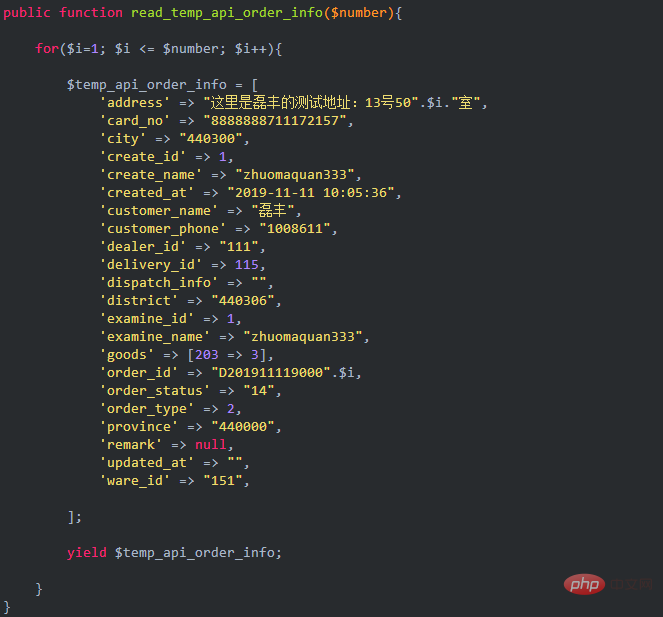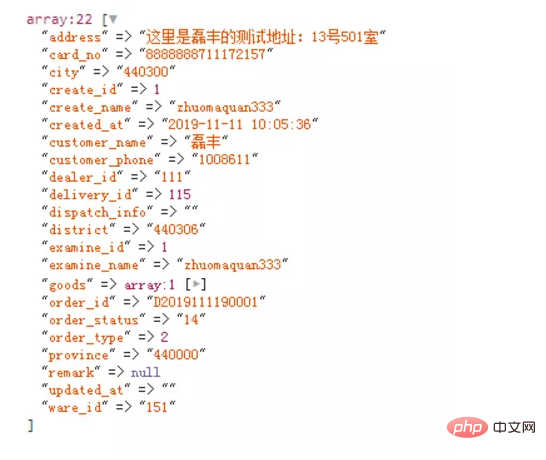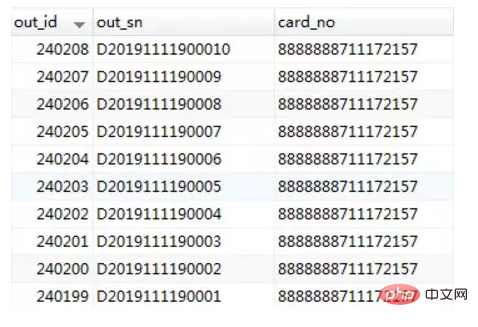 Backend Development
Backend Development
 PHP Tutorial
PHP Tutorial
 PHP generator yield handles large amounts of data business (code example)
PHP generator yield handles large amounts of data business (code example)
PHP generator yield handles large amounts of data business (code example)

Official explanationyield
yield generatoris# Appeared after ##php5.5, the official document explains this: yield provides an easier way to implement simple iteration objects, compared to defining a class to implement Iterator Interface approach, performance overhead and complexity are greatly reduced.
yield keyword. A generator function looks like an ordinary function. The difference is: an ordinary function returns a value, while a generator canyieldGenerates as many values as it needs. When the generator function is called, it returns an object that can be iterated over.
yield is somewhat similar to return, but the difference is that return will return a value and terminate the execution of the code, while yield will return a value to the code that calls this generator in a loop and just pause execution of the generator function.
Here I would like to introduce to you the PHP version of non-buffered query
It means reading the data line by line into the PHP running memory. It is not a one-time read into the PHP running memory. As we all know, PHP has many built-in functions that can help us process the data. Because the data is in the memory, it can be operated, but the PHP running memory has a limit, and the default is 128M. Note: Because non-buffered queries will take a long time to connect to the database, it may cause slow queries, table locks, etc., which consume more mysql resourcesrelative to non-buffered queries The query is a buffered query:
If you use cached query, the PHP memory will directly explode and there will be insufficient memory. Okay, the main purpose here is to highlight yieldyield performance
The generator will have a very large impact on the performance of PHP applicationsSaving a lot of memory when PHP code is runningMore suitable for calculating large amounts of datayield operationUse
Generators allow you to write code in a foreach block to iterate over a set of data without creating an array in memory, which would hit your memory limit or take up considerable processing time. Instead, you can write a generator function, just like a normal custom function, and instead of a normal function returning only once, the generator can yield as many times as needed to generate the values that need to be iterated over. Example explanation
//仓库库存扣除测试
public function cangku_stock()
{
//set_time_limit(0); //表示永久运行,这里我是测试array的时候用到的
$order_info = $this->read_temp_api_order_info(10); //这里我就测试了10条数据,效果是看不出来的
foreach($order_info as $temp_api_order_info){
dd($temp_api_order_info); //打印出来看看数据
//处理数据
$api_ware_id = $this->o->getCangkuApiUrl() .'ware/program/addOutWare';
$out_wares = api_request($api_ware_id, $temp_api_order_info);
$temp_out_wares = json_decode($out_wares, true);
if ($temp_out_wares['code'] != 1) {
$msg = (isset($temp_out_wares['msg']) && $temp_out_wares['msg']) ? $temp_out_wares['msg'] : var_export($out_wares, true);
throw new Exception($msg);
}
}
//dd("批量更新成功".date('Y-m-d H:i:s'));
$this->read_temp_api_order_info(10); If you are calculating the number of data tables, then you need to change this method. Try changing it yourself.

php tutorial!
The above is the detailed content of PHP generator yield handles large amounts of data business (code example). For more information, please follow other related articles on the PHP Chinese website!

Hot AI Tools

Undresser.AI Undress
AI-powered app for creating realistic nude photos

AI Clothes Remover
Online AI tool for removing clothes from photos.

Undress AI Tool
Undress images for free

Clothoff.io
AI clothes remover

Video Face Swap
Swap faces in any video effortlessly with our completely free AI face swap tool!

Hot Article

Hot Tools

Notepad++7.3.1
Easy-to-use and free code editor

SublimeText3 Chinese version
Chinese version, very easy to use

Zend Studio 13.0.1
Powerful PHP integrated development environment

Dreamweaver CS6
Visual web development tools

SublimeText3 Mac version
God-level code editing software (SublimeText3)

Hot Topics
 1389
1389
 52
52
 PHP 8.4 Installation and Upgrade guide for Ubuntu and Debian
Dec 24, 2024 pm 04:42 PM
PHP 8.4 Installation and Upgrade guide for Ubuntu and Debian
Dec 24, 2024 pm 04:42 PM
PHP 8.4 brings several new features, security improvements, and performance improvements with healthy amounts of feature deprecations and removals. This guide explains how to install PHP 8.4 or upgrade to PHP 8.4 on Ubuntu, Debian, or their derivati
 7 PHP Functions I Regret I Didn't Know Before
Nov 13, 2024 am 09:42 AM
7 PHP Functions I Regret I Didn't Know Before
Nov 13, 2024 am 09:42 AM
If you are an experienced PHP developer, you might have the feeling that you’ve been there and done that already.You have developed a significant number of applications, debugged millions of lines of code, and tweaked a bunch of scripts to achieve op
 How To Set Up Visual Studio Code (VS Code) for PHP Development
Dec 20, 2024 am 11:31 AM
How To Set Up Visual Studio Code (VS Code) for PHP Development
Dec 20, 2024 am 11:31 AM
Visual Studio Code, also known as VS Code, is a free source code editor — or integrated development environment (IDE) — available for all major operating systems. With a large collection of extensions for many programming languages, VS Code can be c
 Explain JSON Web Tokens (JWT) and their use case in PHP APIs.
Apr 05, 2025 am 12:04 AM
Explain JSON Web Tokens (JWT) and their use case in PHP APIs.
Apr 05, 2025 am 12:04 AM
JWT is an open standard based on JSON, used to securely transmit information between parties, mainly for identity authentication and information exchange. 1. JWT consists of three parts: Header, Payload and Signature. 2. The working principle of JWT includes three steps: generating JWT, verifying JWT and parsing Payload. 3. When using JWT for authentication in PHP, JWT can be generated and verified, and user role and permission information can be included in advanced usage. 4. Common errors include signature verification failure, token expiration, and payload oversized. Debugging skills include using debugging tools and logging. 5. Performance optimization and best practices include using appropriate signature algorithms, setting validity periods reasonably,
 How do you parse and process HTML/XML in PHP?
Feb 07, 2025 am 11:57 AM
How do you parse and process HTML/XML in PHP?
Feb 07, 2025 am 11:57 AM
This tutorial demonstrates how to efficiently process XML documents using PHP. XML (eXtensible Markup Language) is a versatile text-based markup language designed for both human readability and machine parsing. It's commonly used for data storage an
 PHP Program to Count Vowels in a String
Feb 07, 2025 pm 12:12 PM
PHP Program to Count Vowels in a String
Feb 07, 2025 pm 12:12 PM
A string is a sequence of characters, including letters, numbers, and symbols. This tutorial will learn how to calculate the number of vowels in a given string in PHP using different methods. The vowels in English are a, e, i, o, u, and they can be uppercase or lowercase. What is a vowel? Vowels are alphabetic characters that represent a specific pronunciation. There are five vowels in English, including uppercase and lowercase: a, e, i, o, u Example 1 Input: String = "Tutorialspoint" Output: 6 explain The vowels in the string "Tutorialspoint" are u, o, i, a, o, i. There are 6 yuan in total
 Explain late static binding in PHP (static::).
Apr 03, 2025 am 12:04 AM
Explain late static binding in PHP (static::).
Apr 03, 2025 am 12:04 AM
Static binding (static::) implements late static binding (LSB) in PHP, allowing calling classes to be referenced in static contexts rather than defining classes. 1) The parsing process is performed at runtime, 2) Look up the call class in the inheritance relationship, 3) It may bring performance overhead.
 What are PHP magic methods (__construct, __destruct, __call, __get, __set, etc.) and provide use cases?
Apr 03, 2025 am 12:03 AM
What are PHP magic methods (__construct, __destruct, __call, __get, __set, etc.) and provide use cases?
Apr 03, 2025 am 12:03 AM
What are the magic methods of PHP? PHP's magic methods include: 1.\_\_construct, used to initialize objects; 2.\_\_destruct, used to clean up resources; 3.\_\_call, handle non-existent method calls; 4.\_\_get, implement dynamic attribute access; 5.\_\_set, implement dynamic attribute settings. These methods are automatically called in certain situations, improving code flexibility and efficiency.



